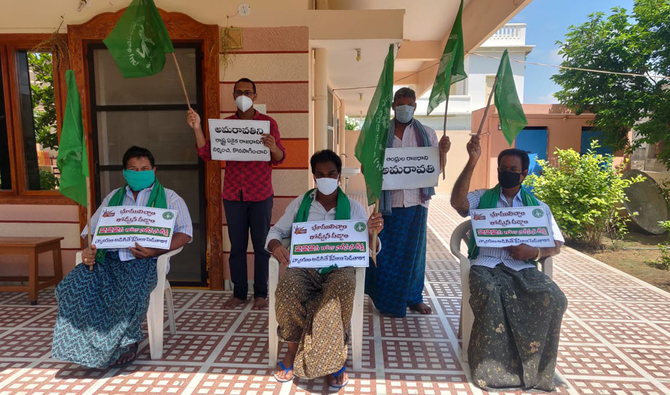NEW DELHI: Nearly 30,000 Indian farmers, the majority of them illiterate, have taken to social media to protest against relocation plans for the state capital of Andhra Pradesh (AP).
Due to the coronavirus disease (COVID-19) outbreak and social-distancing measures, thousands of growers from the southeast Indian state have had no choice but to go online, many for the first time, in order to continue their demonstrations.
Using Facebook and Twitter, they have been rallying global support for their objection to proposals for a decentralized three-city capital for the state instead of original plans to build a new high-tech center in Amaravati.
“Circumstances forced us to weaponize our mobile phones and social media sites and use them to protest against the AP government’s decision to shift the capital from Amaravati,” said P. Bava Sudhakar, of the Amaravati farmers’ joint action committee (JAC).
He told Arab News that farmers from 29 villages in AP’s Amaravati district had been protesting for the past 223 days against the local government’s decision. Up until March they had been organizing sit-in demonstrations and rallies to press for their demands but had to rethink their protest strategy after a nationwide lockdown was imposed on March 25 over the COVID-19 pandemic.
Villagers had learnt to use video communication apps such as Zoom to organize conferences and share grievances with supporters around the world.
In 2014, AP was divided into two separate states – Telangana and Andhra Pradesh – with a plan for Telangana to keep Hyderabad as its capital while AP would have a new capital by 2024.
AP’s previous local government zeroed in on centrally located Amaravati and thousands of farmers donated their land for the construction of the new capital which would have been built with the support of Singapore companies.
However, Chief Minister Y. S. Jagan Mohan Reddy, who was elected to office last May, decided to cancel the project calling it “too ambitious and an unnecessary expense for a debt-ridden state.”
In December, Reddy instead announced plans to create three capitals, with the coastal city of Vishakapatnam to be the executive capital with all government offices, Kurnool to become the judicial capital, with courts, and Amaravati to be the legislative capital.
“The earlier government pegged the estimated cost of building Amaravati’s basic infrastructure at 1,090 billion rupees ($14.5 billion), while the spending capacity of any state government is only 5 billion rupees. At 10 percent of the estimated cost, we can develop places that already have basic infrastructure into capitals,” he had said in the assembly in December.
Since then, thousands of farmers have been demanding a rollback of the decision.
One of them, Pudota Sneha, 22, of Pedaparimi village, near Amaravati was helping her illiterate mother master the use of social media.
“We had three acres of land, and we gave two acres for the building of the capital with the hope that we would be part of the development of the new high-tech city. Now my family is left with just one acre of land, which is not adequate to live and earn,” she told Arab News.
Sneha said her mom had joined countless others on the 200th day of the protests when farmers held a Zoom session with expatriate Telugus in 35 other countries.
Another protester, Sudhakar, who donated 12 acres of land, said: “The idea is to organize opinion of fellow Telugus worldwide and put together a joint campaign against the AP government’s decision to annul the capital project.
“We have at least 100 million Telugu speakers worldwide, and they are all emotionally attached to their motherland. They are also unhappy with the government’s decision.”
The opposition Telugu Desam Party (TDP) of AP has described the chief minister’s move as “vendetta politics.”
TDP spokesperson, Pattabhi Ram Kommareddy, told Arab News: “The decision to make Amaravati the capital was taken after the recommendation of a committee and after proper survey. People came out openly to support the project and gave their land without any dispute. But the chief minister (Reddy) is guided by narrow political vision.”
Analysts said that the issue had now become more complicated. “Political rivalry has got in the way of the development of a new capital,” AP-based political analyst, Sreedharan Jayaram, told Arab News.
“The farmers gave their lands in the larger interests of the nation, but politics has put paid to their hopes. The livelihoods of many farmers are now at stake. This is not good for the development of the state and its people,” he added.





























